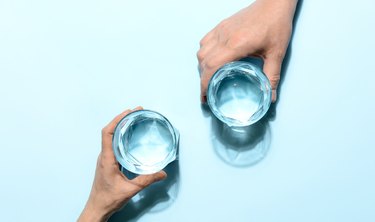
When deciding between ice water and warm water, you won't find major differences in the drinks other than temperature. Although there are situations in which ice water can benefit your body more than warm water, focus on your main priority: drinking enough water to keep you hydrated.
Tip
Whether you prefer ice water or warm water, either will do as long as you drink enough to meet your daily hydration requirements. Neither shows substantial benefits over the other.
Video of the Day
Drinking Ice Water
After an intense workout, drinking cold water when you feel hot can benefit your hydration needs. According to Columbia University, cool fluids leave the stomach faster than warmer ones, which allows for faster rehydration. To achieve this effect, you should drink water within the 59 to 72 degrees Fahrenheit range to cool you from the inside out.
Video of the Day
You don't need to worry about any dangers of drinking cold water. No matter how frigid it is, water won't cause any damage to internal organs.
Choosing Warm Water
You can still choose warm water to meet your hydration needs, although it might not replace fluids as quickly or achieve the same cooling effect. However, if you truly prefer warm water, keep drinking it. If you don't like ice water or feel like drinking something cold hurts your stomach, you might not drink as much and thus hurt your hydration efforts.
In addition, anyone with sensitive teeth might want to avoid ice water, which can provide an uncomfortable sensation when it hits the enamel. Tooth sensitivity is a common issue that affects at least 40 million adults in the U.S., according to the Academy of General Dentistry.
Meeting Your Hydration Needs
Water intake recommendations vary by gender, age and pregnancy, according to the Centers for Disease Control and Prevention (CDC). However, the Dietary Guidelines for Americans 2015-2020 don't recommend a specific daily water intake and also don't endorse any upper set level. The vast majority of healthy people meet their hydration requirements by allowing thirst serve as their guide.
To stay hydrated, drink a glass of ice water or warm water before and in-between meals. You might need more if your skin looks dry and wrinkly or you feel physical and mental fatigue.
Read more: Proper Hydration in the Elderly
Avoiding Dehydration During Workouts
Dehydration can occur any moment you lose fluids faster than you can consume them. The Baylor College of Medicine says the body can condone a water loss of 1 to 2 percent, but anything more can decrease your workout performance and present other issues such as dehydration. When working out, especially in the heat, watch out for dehydration symptoms, which include running a fever, vomiting, cramping and dizziness.
Dehydration can cause a dry mouth, a feeling of thirst, lack of skin elasticity, abnormal blood pressure and elevated heart rate. Complications resulting from dehydration can include brain swelling, seizures, kidney failure and, in extreme cases, unconsciousness and death.
- Centers for Disease Control and Prevention: Get the Facts: Drinking Water and Intake
- The National Academies of Sciences Engineering Medicine: Dietary Reference Intakes: Water, Potassium, Sodium, Chloride, and Sulfate
- The Baylor College of Medicine: Thirsty? You’re Already Dehydrated
- Columbia University: Is Drinking Cold Water Harmful?
- Academy of General Dentistry: Why Are My Teeth Sensitive?